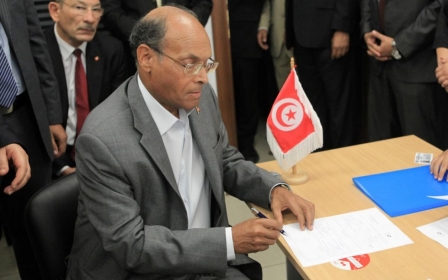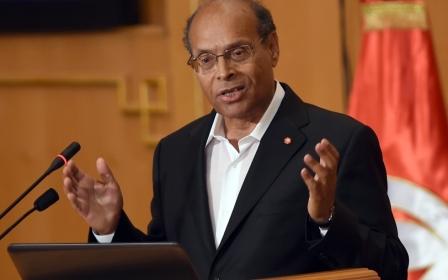Ben Ali's allies seek comeback in Tunisia polls

They became figures of hate during the "Arab Spring" revolution, but stalwarts of Tunisia's ousted dictator Zine El Abidine Ben Ali are planning a political comeback in upcoming elections.
The polls, seen as a milestone in the post-Ben Ali transition, come nearly four years after the self-immolation of a Tunisian street vendor sparked protests that spread around much of the region.
Several parties headed by Ben Ali sympathisers are fielding candidates for parliamentary elections on October 26, and six former regime officials are contesting a November 23 presidential poll.
They include Beji Caid Essebsi, an 87-year-old veteran Ben Ali cadre who was parliamentary speaker in the early 1990s and served as an interim premier after the 2011 revolution.
For many Tunisians like Chokri Mizouri, the return of the political establishment of the Ben Ali years is a "provocation" for people who participated in the uprising.
Ben Ali-era officials "who left through the back door are climbing back in through the window," the 22-year-old student said.
"They should be ashamed of themselves and should not stand on the basis of their experience because their experience is that of corruption and dictatorship," he added.
"And it will be a catastrophe if one of them becomes president because it would restart the machine that we revolted against."
Apology
Many of the Ben Ali sympathisers have spent the last few years trying to play down their role under the former leader, who ruled for more than two decades.
Former transport minister Abderrahim Zouari was arrested after the revolution and accused of corruption, but later released with no charge.
He admitted the previous government made "many mistakes".
"We know these mistakes, and the statesman is someone who recognises his faults and makes up for them," Zouari told reporters, insisting he was now determined to "move the country forward".
Ex-foreign minister Kamel Morjane apologised in 2011 "for having accepted to serve" under the Ben Ali, and has downplayed his responsibilities under the old regime.
One-time health minister Mondher Zenaidi fled Tunisia after the uprising, only returning last month to much fanfare among supporters who gathered at the airport to welcome him home.
'Corrupt and oppressive'
While many oppose their return, some Tunisians fed up with the insecurity that has gripped the country since the uprising believe a former regime strongman could help restore stability.
"The Ben Ali regime was corrupt and oppressive but the people could at least find food to eat," said Karima Ben Hamida, a graduate who has been unemployed for five years.
"Personally, between a presidential candidate from the troika (government) and the 'azlem' (members of Ben Ali's inner circle), I would choose the latter."
Ben Ali, 78, held on to power for 23 years, combining authoritarian rule with a degree of stability.
His escape to Saudi Arabia in January 2011 saved him the humiliation of standing in the dock to answer charges that included corruption, murder and torture.
He was sentenced to life in prison in his absence.
No senior official who served under him is currently in prison.
A law that would have excluded members of the former regime from elections was rejected by an interim parliament dominated by the Islamist Ennahda party, which has appealed for reconciliation.
"We have seen for ourselves the eradication policy in Iraq, which has led to political exclusion there as well as in Libya," Ennahda leader Rached Ghannouchi recently said.
Under Ben Ali's reign, Ennahda activists were among the most persecuted opposition forces.
New MEE newsletter: Jerusalem Dispatch
Sign up to get the latest insights and analysis on Israel-Palestine, alongside Turkey Unpacked and other MEE newsletters
Middle East Eye delivers independent and unrivalled coverage and analysis of the Middle East, North Africa and beyond. To learn more about republishing this content and the associated fees, please fill out this form. More about MEE can be found here.




